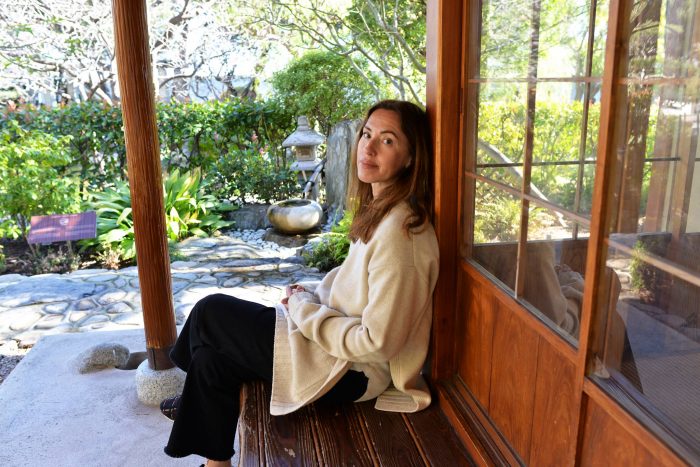Sitting in a restaurant across the table from my daughter, I turn my gaze toward the window, hoping to hide my tears.
I focus on the tree outside. With just a few lackluster remaining leaves, it has lost its autumnal glory. On this gray late November day it looks sad and lonely, eerily reflecting my own state of mind.
The anticipation of a meeting with a loved one is often the bigger part of the actual pleasure of the encounter.
It sounded great: I was going to meet my college sophomore daughter for a few days in New York around the holidays, so we could spend some quality time together, just the two of us. We both looked forward to this, frequently expressing our impatience to see each other, as we joyfully planned favorite activities to tightly fill every delicious day.
So then why, as I finally sit across from my precious firstborn, am I sad to tears?
Was it really that careless phrase she blurted out impatiently, which I could easily forgive if I spent some time processing? Or was it because this was one of many exchanges, between her and her sisters and their father, that have accumulated over time into a stunning realization that I am profoundly alone?
It goes against everything we are taught, as women.
For many years, I have lived with an undisputed conviction that my family is the most important thing in my life. It was taught by my mother and confirmed through societal messages all around me.
Even as a young, professional woman, I’d pay attention to the articles about highly successful women who rose to the top of their careers, but gave it all up to have children before it became too late, and never looked back, finding the gift of motherhood the ultimate achievement.
We are conditioned to believe that when we become mothers we finally step into the main role of our lives. As an heir to the throne must be groomed throughout his life for that momentous day when he becomes the ruler of a nation, so girls are conditioned from early childhood for the sacred role of eventual motherhood.
Except what is often missing in our upbringing is the respect, the reverence, and protection such a role should command.
Girls are not taught that we are sacred, that our bodies are magical containers for potential new life. We are not taught how best to take care of our own physical and mental well-being, so that we can be in balance and full awareness of what demands will be placed on us physically and emotionally.
Women’s lives and health are consistently marginalized, as evidenced by the continuous debate on whether to legalize abortion and funding cuts for centers for women’s reproductive health. From menstruation being viewed as either inconvenient or disgusting, to our inability to accept and appreciate the natural shapes of our bodies, women are taught self-hate from an early age.
By the time we have children, we are expected to be in full sacrifice mode. And we dive into that role with conviction and zeal. Any less than ideal experience is viewed as personal failure. Like everything else in our lives, motherhood has become another arena of competition for achievement.
Since women are raised with a sense of incompleteness and inferiority, we use every opportunity to prove ourselves worthy. Since a lot of our value in society is judged by what kind of wife and mother we are, our own lives become of secondary importance as we compete for the title of “perfect supporting act.”
By the time our children are born we have successfully integrated into our role of self-judge, comparing ourselves to Instagram photos and advertisement spreads of the perfect babies other women seem able to produce.
Most women I speak to suffer from guilt and constant suspicion that we are not being or doing enough, due to the misguided belief that we must produce perfectly happy, smiley, and overachieving people.
The dynamic is complicated because we bring to it our own unprocessed baggage from childhood: legacies of shame, blame, and unworthiness. So, when our children struggle, we do not see that as part of normal development, because it reactivates our own memories of suffering when we were their age. We then try to do everything to fix any arising problems, micromanaging our children’s lives to the extent that there is no longer room for our own.
The more we sacrifice our own lives in an attempt to shelter our children from any potential difficulties, and make them “happy,” the more statistics reflect the opposite effect. Our children are becoming increasingly unhappy, anxious, and medicated.
What used to be viewed as the normal emotional turmoil of growing up, is now corrected by pills, as we become unable to tolerate less than perfectly happy children, fearing what it says about us. As we strive to raise overachievers, we are willing to medicate them for better performance at school.
In our need to be validated as good parents, we remove any opportunity for our children to learn how to cope with difficulties, teaching them instead to eliminate inconvenient emotions through substances.
Most of us live with a mistaken perception that we are responsible for the happiness of others and expect them to make us happy, in turn. We then spend all our effort trying to achieve the impossible, in the process setting ourselves up for disappointment and constant frustration.
The truth is that love and happiness cannot be delivered from the outside, but come as a natural by-product of living lives in alignment with our own needs, desires, and natural proclivities.
Today, I know that the only happiness we are responsible for and actually have the power to achieve is our own.
In promoting self-love and self-responsibility among women, I face a lot of pushback. It’s a completely foreign concept for women with children to focus on self-care and on our own well-being. We are taught to give our all to our children and partners with the assumption that our own needs are automatically met through the joy of having the family.
In reality, the majority of women I speak to are struggling, battling disappointment, burnout, depression. Needless to say, this puts tremendous pressure on our families and all the relationships we engage in, perpetuating unhealthy relating and passing on a dysfunctional dynamic to our children.
Grounded in my own experience, I have made it my mission to educate women on the necessity of self-love and self-care as a cornerstone of good parenting and, indeed, a good life.
When we are well—physically and mentally—our state of well-being spills out to everyone who shares our lives. As we learn self-acceptance, self-forgiveness, and self-compassion, we become better parents and better partners, because we become more compassionate and tolerant of their humanity as well.
What we also fail to realize is that the way we treat ourselves sends a powerful message to our children and partners about how we accept being treated. If we are consistently putting ourselves last we should not be surprised when our partners and children do the same. Yet, when they become dismissive and disrespectful, we are hurt profoundly, taking it personally, feeling like a victim in the system that we end up perpetuating by our own unconscious behavior.
As I sit across from my daughter, I realize that our whole experience of motherhood is similar to what I feel now: bridging the gap between our Hallmark-worthy expectations and the inevitable messy reality of our human relationships.
No one teaches us that our children are not extensions of us. That they do not belong to us, nor are they here as a measure of our value. We must learn that we are just their custodians, responsible for their safekeeping until they are ready to fly off and lead their own lives. That, although we are family, each of us is sovereign.
As I process my own emotions I realize that none of it is personal. My daughter’s moods will not destabilize me, nor will I use them as a judgment of myself as a parent. I will not allow myself to recoil from this seeming slight and close myself in silent woundedness and resentment, because my love for her is within me—sacred—and will not be swayed by anything external.
Our sense of incompleteness as women and mothers comes from false beliefs that we have inherited through family and societal conditioning.
It is our responsibility to wake up to perpetuating this dynamic, so that we stop passing it on to our children.
Breaking this chain is important.
As I raise three young women and coach others, I feel the need to create a new belief system, a revolution, because our lack of self-love is no longer serving us, or anyone around us.
Bonus watch:
 Share on bsky
Share on bsky





Read 65 comments and reply